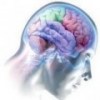When do we learn to imagine the future, and how is that capacity based on imagining the past? How does this kind of "mental time travel" develop? Lagatutta's recent article in Child Development tracks the development of this impressive feat, thought by some to be uniquely human.
At 3 years of age, a variety of mental processes seem to undergo rapid development, including task-switching, theory of mind, linguistic generalization, and an understanding of time. Previous work by Lagatutta and colleagues showed that up to 39% of 3 year olds could attribute sadness in a story's character to that character's past experiences, indicating some burgeoning episodic awareness of time.
To follow-up, Lagatutta asked 64 children to read six stories, with visual illustrations on notecards, involving negative experiences caused by an entity that was itself later re-encountered. Each story had two alternate endings: in the "emotion" ending, the focal character is said to become worried after re-encountering the agent of the negative experience, whereas in the "behavior" ending, the focal character simply takes an action that might be motivated by such worry. Children were also asked control questions about a "naive" character who didn't have the same previous experience as the focal character.
The results showed that only 4-year-olds provided fewer explanations of the focal character's behavior or emotions that referenced the past and future than adults, when the sample was limited to only those subjects who didn't also provide the same response for the naive friend. (Note: Other results from this first experiment may seem suspect due to the yes bias common among children of this age [particularly with the "prompted" explanations]). The authors conclude that an understanding of the person-specific nature of temporal experience continues to develop after age 4.
A second study with another group of 64 children involved the same characters and features, except that the causal agent of the negative experience was not re-encountered later; instead, something perceptually similar to that agent was encountered. In addition, children were asked to predict the focal character's emotion for half the stories, and to interpret their behavior for the latter 3.
In the fist half, only three year olds failed to predict that the focal character would be worried more often than expected by chance, and fewer 3-year-olds provided explanations of the character's states which involved time. Both 4- and 3-year-olds failed to assign neutral emotions to the naive character more often than would be expected by chance. Finally, all children were more likely to produce explanations involving time when they had been told about the character's emotions rather than simply asked to interpret it.
The findings from this article are not surprising - young children are relatively poor at explaining other's mental states, particularly when they must predict them in the first place, and these capacities improve with age. Nonetheless, they add to a growing body of literature showing that "mental time travel" is a challenging and late-developing cognitive skill. More importantly, these results begin to address some theoretical perspectives on "mental time travel," which posit that imagination of the future is intrinsically based on our understanding of the past.
Lagattuta , K.H. (2007). Thinking About the Future Because of the Past: Young Children's Knowledge About the Causes of Worry and Preventative Decisions. Child Development, 78(5), 1492-1509.
- Log in to post comments

Interesting, though some of the terminology seems pretty fast and loose. I have little doubt that plenty of non-human species extrapolate future events based on prior experience (that's basically what learning is). It would be extremely difficult to process noisy or ambiguous input, or to successfully carry out many complex motor tasks (like hunting prey) without internal mechanisms to predict future events. I would guess that the temporal scale for this ability would vary widely among species, but this seems like a quantitative, and not qualitative, distinction.
Hey derek, thanks for the thoughtful comments as always.
I agree that "mental time travel" in some sense cannot be uniquely human, since all organisms show change in behavior based on experience (i.e., memory) and an ability to react to events to shape the future (i.e., "future-oriented thought"). Of course there are important differences between those capacities and what humans do, but I agree with you that neither these articles nor I did a good job of explaining those differences.
One is that mental time travel in humans appears to be more context-independent than that in animals; we can freely imagine the past or future without needing to have strong reminders or cues for that in our external environment. I'm not sure that any animal would sit and wonder what it will or did have for dinner if it's not currently hungry. (not an testable question, but you get the idea).
I like the final paragraph, linking Memory of the Past with Imagination of the Future. It makes the Nature of Time appear more cyclical than linear. We draw from our Knowledge of Yesterday in order to Infer what the Future of Tomorrow may bring. Interesting article. Yet...I would give more credit to little children and their ability to perceive the Nature of Time. I believe that the mind of the infant is more complex than we yet understand. But this is just the humble opinion of one less-than-scientific woman...
Rachel Eagle Reiter